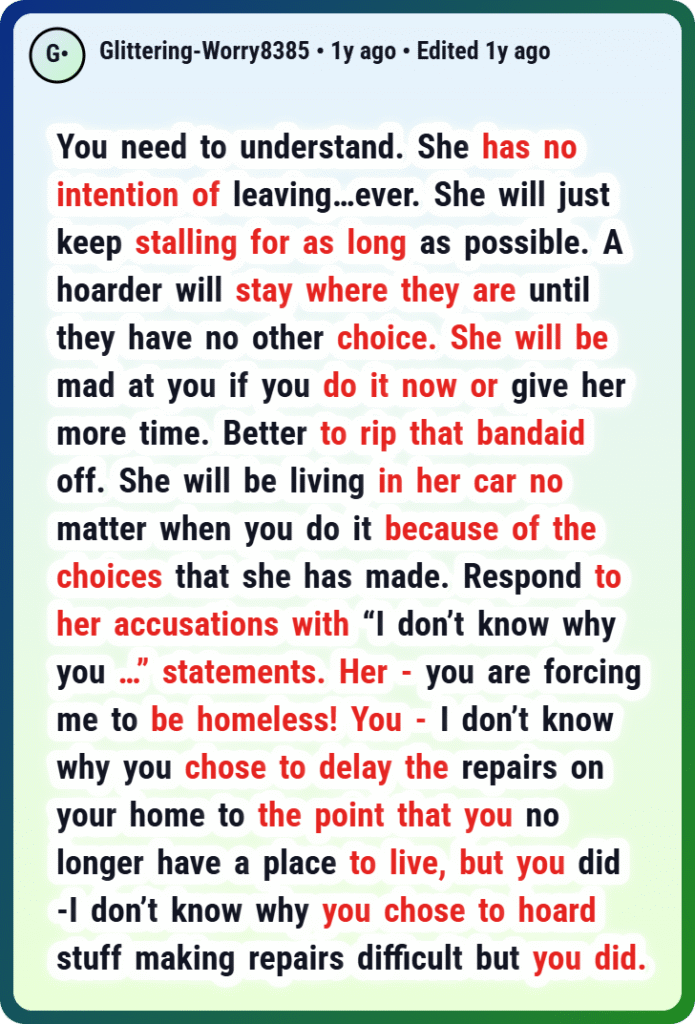She Won’t Leave Our Inherited Home: Evicting My Hoarder MIL Is Tearing Us Apart
When you inherit a home, the last thing you expect is for it to come with an uninvited, immovable guest—especially one that’s family. That’s the situation for a young Wisconsin couple who received a house from a late relative, only to find themselves stuck with the husband’s mother, a hoarder who refuses to leave. Originally staying temporarily after a house fire, she’s now been in the home for nearly a year after the uncle’s passing, and she’s making life a legal and emotional nightmare. No lease, no rent, but a whole lot of drama.
Despite being the executor—not the beneficiary—she clung to control over the estate until very recently, delaying the handoff. Now that the couple finally owns the property, she’s sabotaging their attempts to renovate, blocking contractors, screaming during walkthroughs, and stuffing the home with more junk. They’re stuck between feeling guilty about evicting her (because she’d be homeless) and watching their inherited property fall into disrepair. Add to that the legal maze of eviction laws, family tensions, and the growing risk of the home being condemned, and you’ve got a pressure cooker situation waiting to blow.
This isn’t just about a house—it’s about boundaries, legality, and hard choices when personal relationships mix with real estate.
You’re basically expected to go the extra mile for family, but this woman’s mother-in-law is taking things way too far for her liking

The woman and her husband have inherited a house from the husband’s late uncle, but the mother-in-law is refusing to move out of it












When Your Hoarder MIL Refuses to Leave Your Inherited House – What Now?
Alright, let’s talk about a worst-case homeownership headache: inheriting a house and then finding out… you’ve basically got a squatter living inside it. Even worse? That squatter is your mother-in-law, and she’s a hoarder.
That’s exactly what this Wisconsin couple is dealing with. They inherited a home from a relative, but their MIL—who was temporarily living there after her own home caught fire—just won’t leave. She’s refusing access to contractors, piling the house full of stuff, and making emotional scenes when anyone tries to help or make repairs. No rent. No lease. No peace. And now? They’re wondering: do we have to evict her?
Let’s break down how the law sees this, what your real options are, and how to walk that fine line between legal rights and family drama.
1. Is She a Tenant or a Guest?
This is where a lot of people get confused. If there’s no lease, no rent payments, and no formal agreement—can she even be evicted?
Short answer: Yes, probably.
In Wisconsin, someone who lives in a home for a significant time—even without a lease or rent—can still be considered a “tenant at will” or holdover tenant. That means normal landlord-tenant laws apply even if she’s your MIL and even if the stay was supposed to be “temporary.” So yeah, even family can turn into tenants if they’re staying long enough.
So, if she’s not leaving on her own? You may have no choice but to serve her an eviction notice like any other renter.
2. Can You Just Kick Her Out?
Nope, and don’t even try.
Self-help eviction is 100% illegal in Wisconsin. That means you can’t:
- Change the locks
- Shut off utilities
- Throw her stuff out
- Or make her life miserable until she leaves
All of that is a legal no-no and could backfire badly.
Instead, you need to go through the proper eviction process. That means serving notice, filing paperwork in small claims court, and—if she still won’t go—getting the sheriff involved to remove her.
And yeah, it can take time.
3. What Kind of Eviction Notice Do You Serve?
Okay, so how do you actually start?
It depends on how you want to go about it.
If you want her gone without any drama or cause:
Serve a 28-Day Termination Notice.
- It’s simple.
- Doesn’t need a reason.
- Just says, “Hey, your time here is up. You’ve got 28 days to go.”
If she’s damaging the property or making it unsafe:
You can go a little harder:
- Start with a 5-Day Notice to Remedy or Vacate
- If she doesn’t clean up or stop blocking repairs, then serve a 14-Day Notice to Quit
- Then file for eviction in court
This route might get faster results, especially if you’re documenting hoarding, destruction, or refusal to allow access for repairs.
4. The Emotional Toll: She’s Still Family
Let’s be real—this isn’t just a legal mess. It’s a family one.
Evicting a stranger sucks, but evicting your husband’s mother? That’s a relationship bomb. And you know what? That’s probably why she’s dragging her feet. She’s betting on guilt, fear, and awkwardness keeping her in that house longer.

And from what you described—screaming at contractors, buying more stuff while you’re trying to clean, refusing to give keys—it’s not just about “needing time.” It’s control. And maybe fear. Hoarding is often tied to trauma or anxiety, so she may need support, not just a court date.
But her behavior is also risking:
- Property damage
- City code violations
- Condemnation of the house
- Delays in your renovation and living plans
You’ve got to weigh protecting her emotions vs protecting your investment—and your mental health.
5. Should You Try “Cash for Keys”?
Before you go full legal, consider this trick: cash for keys.
It’s not legally required, but sometimes a small cash offer to leave voluntarily can work better than a court order. Offer her:
- $1,000–$2,000 to move out in 30 days
- Help paying for a storage unit
- Help coordinating the completion of her home renovation
You’d be surprised how many stubborn tenants accept the deal to avoid eviction court. It’s cheaper, faster, and sometimes—way less drama.
Just be sure to:
- Get it in writing
- Set a hard deadline
- Only pay once she’s out
6. Document EVERYTHING
Since this could get messy, protect yourself:
- Keep all text messages/emails
- Take photos of property damage or hoarding
- Log all your attempts to give notice
- If she refuses access for repairs? Record that too
That documentation will help your case in court and protect you if she tries to claim harassment or unfair treatment.

Also, consult a Wisconsin landlord-tenant attorney if things escalate. You’ll need a clean paper trail.
7. What Happens If She Still Won’t Leave?
If she ignores the eviction notice, you’ll file an eviction lawsuit in Wisconsin small claims court. The court will set a hearing, and if you win, the sheriff can physically remove her.
It sounds harsh, but at some point, protecting your future comes first.
You can still support her—help her transition into her own home when it’s ready, or help her find resources for hoarding—but you don’t have to sacrifice your life plans in the meantime.
In the comments, readers weighed in with advice, while the original poster did her best to answer the questions posed and shed more light on the situation









This situation sucks, but you’re not heartless for wanting her out. You inherited this home. She’s not the beneficiary. You’ve got plans. You’ve got contractors. You’ve got every right to protect the home and your mental well-being.
Family can make landlord-tenant situations emotionally brutal. But following the law, staying firm, and choosing clarity over chaos will always serve you better in the long run.

